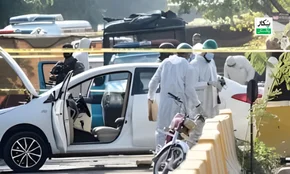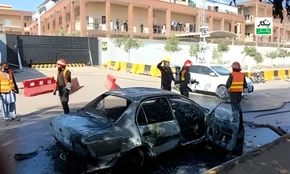A suicide bombing in Islamabad on Tuesday killed 12 people, marking a sharp escalation in militant attacks across Pakistan. Defense Minister Khawaja Muhammad Asif declared the country was now in a “state of war”, warning that Pakistan would respond if neighboring Afghanistan failed to curb militant activity.
According to government officials, the bombing occurred outside a lower court in the federal capital, making it the first major civilian attack in Islamabad in over a decade. The explosion also left 27 people injured, several in critical condition.
➡️ For more updates on national and regional security news, visit the Pakistan News section of Pukaar Pakistan.

Pakistan Accuses Afghanistan of Harboring Militants
Following the attack, Pakistani ministers accused Afghanistan’s Taliban-led administration of harboring groups like the Tehreek-e-Taliban Pakistan (TTP). Interior Minister Mohsin Naqvi said the attackers were in contact with handlers in Afghanistan and warned that Islamabad might retaliate if Kabul did not act against these militants.
“We are totally clear that Afghanistan has to stop them,” Naqvi stated. “If not, Pakistan will handle those terrorists attacking our country.”
The Taliban government in Kabul condemned the bombing but denied Pakistan’s allegations. A spokesperson expressed “deep sorrow” over the loss of life but reiterated that Afghanistan does not allow its territory to be used for attacks on others.
India Rejects Pakistan’s Allegations
Amid rising tensions, India’s foreign ministry issued a statement rejecting Islamabad’s claims of Indian involvement. The ministry described the accusations as “baseless and unfounded.”
Analysts, however, warned that the escalating blame game between Islamabad, Kabul, and New Delhi could destabilize an already fragile regional security landscape.
Islamabad Blast: Scene of Chaos
Eyewitnesses reported scenes of panic outside the court. The suicide bomber detonated himself near a police vehicle after failing to enter the building.
Local media showed graphic footage of vehicles on fire and people covered in blood. Security forces cordoned off the site and launched a full investigation.
Interior Minister Naqvi confirmed that 12 people were killed and 27 injured, adding that rescue operations were swift but challenging due to heavy crowds.
➡️ Explore more breaking stories in our World News section.
Militants Also Target School in Northwest Pakistan
Just a day before the Islamabad bombing, militants attacked a school in Wana, northwestern Pakistan. The assault began when a suicide vehicle rammed into the entrance, killing three people.
Gunmen then entered the school — which is managed by the military but educates civilians — trapping nearly 500 students and staff.
Security forces later confirmed that three militants were killed after an overnight standoff. The attack drew comparisons to the 2014 Army Public School massacre in Peshawar, where over 130 children were killed.
Analysts Warn of Rising Violence
Experts, including Abdul Basit, a Senior Associate Fellow at Singapore’s Rajaratnam School of International Studies, noted that new militant factions appear to be emerging, giving groups like the TTP plausible deniability for such attacks.
“They’re sending a signal that if there are strikes in Kabul, Islamabad will not be safe,” Basit said.
Former military officers warned that these coordinated attacks were aimed at creating panic and destabilizing Pakistan’s internal security.
Conclusion: Pakistan’s Growing Security Challenge
The suicide bombing in Islamabad has heightened fears of renewed militant activity in Pakistan. With rising tensions involving Afghanistan and India, Islamabad faces the challenge of securing its borders while maintaining internal stability.
Stay informed: Follow the latest updates on national security, politics, and world affairs at Pukaar Pakistan.












